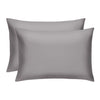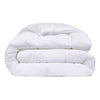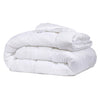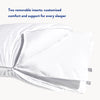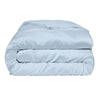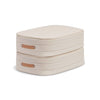The Daily Miracle
10 Tips and Tricks on How To Get More REM Sleep
Published
March 07, 2023
Author
Bridget Reed

Sleep is crucial to your overall health. While any sleep is appreciated, to truly reap the benefits a good night's sleep provides, you need enough REM sleep.
We’re talking about that deep sleep, the kind that leaves you feeling refreshed, rejuvenated, and ready to conquer the day. This is the kind of sleep that doesn’t require one, two, or three snoozes to get out of bed.
If you’re a victim of poor sleep and waking up feeling like you’ve barely had any shut-eye, the culprit is likely a lack of REM sleep. Certain sleep conditions like insomnia and chronic sleep deprivation can have a major negative impact on your life. However, there are tips and tricks you can try to manage the symptoms, resulting in higher energy levels and a healthy, happier you!
What Is REM Sleep?
Before we talk about how you get enough REM to function properly, let’s first talk about what REM sleep is and why it’s important.
REM, or rapid eye movement, is a period in your sleep cycle that occurs multiple times at night (if you’re getting enough of it). Only mammals and birds experience REM sleep.
As your eye movement picks up, your heart rate increases, along with your eye movement and brain activity. REM happens when you get into a deep, restful sleep and have dreams. If you’re dreaming multiple times a night, you’re likely getting enough REM sleep.
REM sleep plays a significant role in your brain's memory, emotional processing, and overall development. That’s why after a poor night's sleep, you can feel groggy, cranky, or downright miserable.
Generally, you should experience three to five REM cycles per eight hours of sleep. Even if you don’t remember a dream occurring, it doesn't mean you didn't have enough REM cycles. Sometimes, we simply forget our dreams.
Each REM cycle will get longer as the night progresses, and some can last up to an hour. The most efficient way to track your REM sleep (or sleep in general) is by investing in a watch or bedside device that tracks your sleep. Watches are fantastic for detecting REM periods as they can follow your heart rate.
A general rule to follow is that for every seven to eight hours of sleep, you should be in a deep REM sleep for 90 minutes. Expect to see up to eight REM cycles per night.
What Happens When You Don’t Get Enough REM Sleep?
Not getting enough sleep can affect your health, but adequate REM sleep is also crucial. For many mammals, REM sleep plays a significant role in the hippocampus and its ability to form memories, retain information, learn, and navigate life.
Not getting enough REM sleep can cause drowsiness, difficulty concentrating, and forgetfulness.
How To Get More REM Sleep: 10 Tips and Tricks
Below are ten tips and tricks to follow to get more REM sleep and wake up feeling rested and refreshed.
1. Avoid Caffeinated Beverages
We don’t mean cut out your sacred morning cup of joe — simply cut back.
Caffeine has a tight hold on most adults’ lives, and considering 50 to 70 million US adults have reported sleeping issues, there may be a solid correlation.
Instead of your afternoon pick-me-up, try switching to decaf. You’ll still have your steaming (or iced) beverage, just minus the unwanted stimulant. Try not to think about its lack of caffeine; perhaps you’ll still experience a placebo effect.
2. Ditch Your Evening Wine
While a glass of wine (or two) with dinner is relaxing in the moment and may make you feel sleepy, alcohol and sleeping well do not go hand-in-hand.
Alcohol consumption before bed interferes with your body's natural sleep cycle, causing an interruption in your REM sleep.
3. Say Bye-Bye to Cigarettes and Vapes
Like caffeine, cigarettes and vapes are stimulants. They can prevent you from falling asleep and getting a good night's rest.
4. Start a Sleep Schedule
If you’re a parent, you know the power of a sleep schedule, and while it may seem silly to implement one on yourself, you’ll be glad you did.
Going to sleep and getting out of bed at the same time every day trains your brain to get tired at those times. Sleep schedules are especially beneficial when paired with a solid nighttime routine.
5. Follow a Bedtime Routine
Nighttime should be your you-time. Put down your laptop, and yes, stop scrolling TikTok 30 minutes earlier. It’s time to pamper yourself!
Implementing a relaxing bedtime routine will prime your body to start producing melatonin, as it knows sleep is near. Plus, sometimes nothing makes you sleepier than a relaxing shower, skincare routine, and foot massage.
Don’t be afraid to “overdo it.” Put on your favorite album, read a book, do some yoga — anything to get you in the right mindset.
6. Create the Perfect Ambience
Your environment plays a crucial role in your sleep, and if your room isn’t as zen as possible, your sleep may suffer.
Ditch the bright lights, get your room to the ideal temperature (60 to 67 degrees Fahrenheit), and ensure your bedding is as luscious and plush as possible. Deciding on the right sheets, comforters, and pillows isn’t easy and may require some research. Just as your environment can affect your sleep, so can your bedding. Comfortability is the key to perfect sleep.
7. Implement an Exercise Regime
Daily exercise aids stomach discomfort, soothes muscle aches, and can even boost your overall energy levels. Even if it’s something minor, like a walk around the block, getting up and moving your body can help regulate your body temperature and hormones resulting in a more deep sleep.
8. Don’t Lie Around
While it’s tempting, laying in your bed for extra time may be why you can’t get into a deep sleep, especially if you wake up in the middle of the night. Laying awake won’t make you tired, so it’s best to do something quiet and relaxing. Read a book, stretch, or listen to relaxing music.
9. Consider a White Noise Machine
White noise masks the sounds of the outside world, which can help you stay in a deeper sleep for longer. White noise machines are almost a must if you live in an apartment building or in a big, busy city.
10. Avoid Blue Light
Blue light is a hue on the light spectrum with a higher energy and shorter wavelength than other light colors.
Electronic devices like computers, tablets, phones, and TVs give off this blue light. The high energy waves blue light gives off can cause our brains to remain ultra-alert, sending a message to hold off on melatonin production.
If you’re an avid social media browser, television watcher, or late-night worker, chances are that’s the reason you can’t get into a deep sleep.
If you can’t entirely give up your electronic devices, we suggest getting blue light-filtering glasses or screen covers. While the best fix would be cutting them out close to bedtime entirely, this tip may help prevent symptoms of blue light exposure.
Sweet Dreams!
All sleep is important, but especially REM sleep. Don’t spend your life in a fog; try these ten tips and tricks on getting more of the sweet, sweet REM rest!
Sources:
The Best Temperature for Sleep: Advice & Tips | Sleep Foundation
Alcohol and Sleep | Sleep Foundation
What is REM Sleep and How Much Do You Need? | Sleep Foundation.


